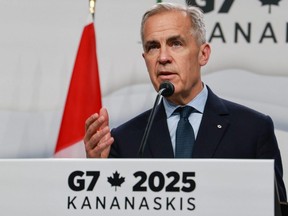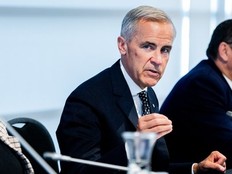GOLDSTEIN: Removing all of Trump’s tariffs no longer realistic
Negotiating a deal with the U.S. President that Canadians can live with is more realistic

Article content
While Canada’s official goal in trade negotiations with the U.S is to remove all tariffs imposed on us by President Donald Trump, it’s now clear this is an aspirational target rather than a realistic one.
The realistic one is to negotiate a deal with Trump that Canadians can live with, given that the U.S. President, a self-described “tariff person,” is on a campaign to use them to demolish the existing global economic order in favour of the U.S.
If Prime Minister Mark Carney can pull a rabbit out of his hat and get all of Trump’s tariffs removed by Canada’s new negotiating deadline of Aug. 1 – replacing the previous deadline of July 21 – all power to him, but that’s a huge hill to climb.
In fact, both of these dates were and are artificial lines drawn in the sand that put unnecessary pressure on Canada to reach a deal, when the real issue is what’s in the deal, not when it’s signed.
Carney announced the July 21 deadline – saying Trump had agreed to it – at the G7 meeting Carney chaired in Kananaskis, Alberta in mid-June, following direct talks with the U.S. President and meetings between Canadian and U.S. negotiators.
At the time, optimism was running high with Trump, while not publicly committing to any specific date, saying he thought a deal with Canada was possible.
In explaining his reasoning for the 30-day deadline, Carney said “in negotiations, having a form of deadline is helpful to concentrate the mind.”
But within days, Carney was downplaying whether it was possible to achieve an agreement by July 21, making the obvious point that despite having a so-called deadline, “nothing’s assured.”
Since then, Trump has threatened to end the trade talks because of Canada’s digital services tax on U.S. tech giants, which Carney quickly scrapped in order to restart the negotiations, raising legitimate criticism that folding so quickly was a far cry from his “elbows up” rhetoric during the federal election.
Trump then announced a 50% tariff on copper and a 35% tariff on Canadian imports not covered by the Canada-US-Mexico Agreement Trump agreed to in his first term as president.
Trump said both of those tariffs will come into effect on Aug. 1.

In response, Carney said Canada is now working towards Trump’s Aug. 1 deadline for imposing new tariffs, to come up with a deal, meaning Canadian negotiators are now working on a deadline imposed by Trump.
Conservative Leader Pierre Poilievre told CBC’s The House on Saturday, correctly in my view, that it was a mistake for Carney to get into the game of deadline-setting with Trump.
“The challenge with a unilateral, self-imposed deadline is that it tells the counterparty that they have you on a clock – a clock that only applies to you,” Poilievre said.
“I personally think it would have been better not to show that up front to the Americans because we know that President Trump will try to take advantage of it.”
Carney had previously said that if no trade deal was reached by July 21, Canada would impose counter-tariffs in response to Trump’s announcement he would double tariffs on Canadian steel and aluminum to 50% – which he announced prior to the G7 meeting.
In light of the new Trump-imposed deadline of Aug. 1, Canada now says it will delay that move pending the outcome of the negotiations by that deadline.
RECOMMENDED VIDEO
But counter-tariffs themselves are problematic because they raise the cost of living for Canadians on tariffed goods imported from the U.S.
As Industry Minister Melanie Joly has noted, save for China, Canada is the “only country in the world” to have already imposed “so many” counter-tariffs on the U.S.
The Carney government says it will use the increased revenue from its counter-tariffs to provide financial support to Canadian workers in tariff-vulnerable sectors of the economy.
In terms of the political impact of all this on Carney, it will depend on what the deal with Trump says – if any deal is possible – rather than when it’s signed.
This with the caveat that it was Trump who started this tariff war and whether it would have been possible for any prime minister to achieve a good deal for Canada, using confrontation or capitulation tactics, against a determined and unpredictable American president armed with an economy 10 times the size of our own.














Postmedia is committed to maintaining a lively but civil forum for discussion. Please keep comments relevant and respectful. Comments may take up to an hour to appear on the site. You will receive an email if there is a reply to your comment, an update to a thread you follow or if a user you follow comments. Visit our Community Guidelines for more information.